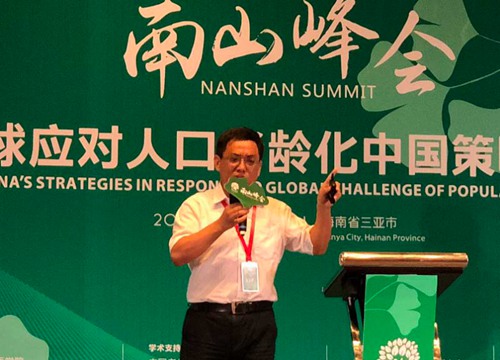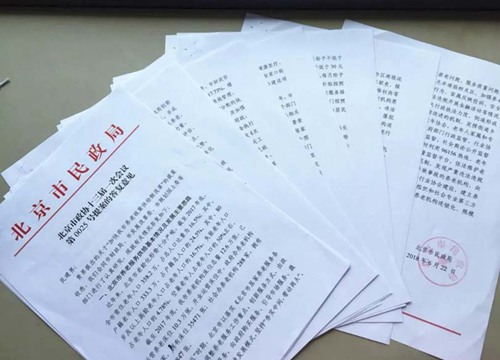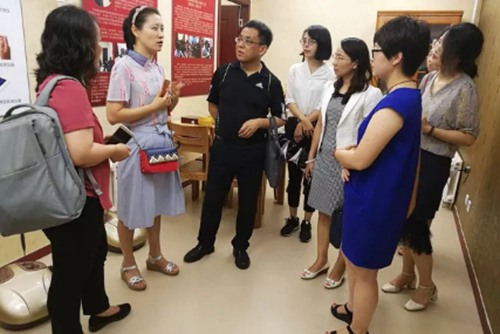 Research Update
Research Update
13
SeptemberThe research report Suggestions on Accelerating Beijing Elderly Care Supply-side Structural Reform written by Huang Shisong, research fellow of National Academy of Development and Strategy (NADS), RUC, won the second award of 2017 Beijing Municipal Outstanding Democratic Parties Consultation Researches from Beijing Municipal United Front Work Department.
Huang and his team noted that the aging of population will be the fundamental reality of China throughout the 21th century. However, the public are underprepared for the challenges and opportunities brought by the aging pollution as the whole society still doesn’t fully recognize the complex, difficult and persistent nature of the problem, thus less motivated and can’t reach a social consensus.
Taking Beijing for example, according to the Statistics Bureau, registered population aged 60 and above reached 3.333 million by the end of 2017. The number of permanent resident senior people is estimated to be over 4 million in 2020, 5 million in 2030, more than 6 million in 2040, and the trend will keep going until the end of this century. As single-child parents becoming the main force of elderly population, all kinds of problems such as family with few children or no child, empty nest elderly, and senior people with disabilities will emerge simultaneously in the short term. Such a basic situation will been seen for a long time in the future.

Huang submitted his research report at the First Session of the 13th Beijing Municipal Committee of CPPCC as a draft proposal for Beijing Pension Reform in January, 2018, listing 20 policy and legislative suggestions from 5 dimensions, namely, improving business environment, advancing information construction, focusing on sustainable operation, building quality evaluation system, and enhancing publicity and supervision.
In August, 2018, Beijing Municipal departments made joint response to Huang’s proposal in Comments and Responses to No. 0025 Proposal at the First Session of the 13th Beijing Municipal Committee of CPPCC, “the Proposal recognized the achievements Beijing has made in elderly care, at the same time made targeted suggestions on solving current and potential problems. The proposal is of great value for Beijing government to improving its capability of serving the aged”. Huang’s 20 suggestions in 5 dimensions will be accepted 100% by the government departments, several of which have already been included in the announced policies.

NADS RUC in recent years has encouraged its researchers to increase effective interaction with the party committee and government and to participate in deliberation of state affairs as democrats. It is an innovative approach adopted by NADS to help solve the social problems relying on the think tank’s platform resources and strength. RUC NADS sticks to the goal of “national strategy, global vision, decision-making consultation, public opinion guidance”, focuses on knowledge innovation and global future, strives to become a new Chinese think tank with international influence, and serves for national development strategy and social progress.
Over the years, Huang and his team made tireless efforts to investigate and study issues mostly concerned with every family and by the people. Meanwhile, democratic consultation and supervision are guaranteed while conducting the research. As Vice Chair of Beijing Municipal Committer of China National Democratic Construction and Member of Beijing Municipal People’s Congress, Huang could leverage various channels and resources from both NADS the think tank and the democratic parties to push forward scientific and democratic decision-making and problem-solving in practice.
To make the research thorough and obtain first-hand facts from the grassroots, Huang and his team had 14 special research surveys from February to September, 2017 all over the districts of Beijing. The team investigated issues related to high-end nursing apartments, community elderly service center, internet healthcare enterprises, information platform for senior care during field visits. They paid home visits to several subdistrict communities at Beitaipingzhuang Street, Haidian, and Taoranting Street, Xicheng for questionnaires. Besides, Huang had panel discussions with Civil Affairs Bureaus of Changyang, Shijingshan and Dongcheng, talking about building of 4-tier elderly care system, IT application on senior care, and market supervision respectively. They also participated in several law enforcement inspections led by the Standing Committee of Beijing Municipal People’s Congress. Relying on all these investigations and support of Civil Affairs Bureaus and Aging Working Committee Office, Huang’s team completed the research with one general report plus seven special reports.

Huang and his team adopted multiple approaches of questionnaire, field visit, interviews, public and private investigations to make the research thorough regardless of how long it would take and how complicated the problems are. Huang’s down-to-earth style and practical approach encapsulated the fine tradition and innovative practice of NADS, RUC.
And it is not the first time that Huang spent years tracking down one livelihood issue and making a difference through research. His research reports, Suggestions on Advancing Coordinate Development of Senior Care Industry in Beijing-Tianjin-Hebei won the third award of 2015 Beijing Municipal Outstanding Democratic Parties Consultation Researches, Suggestions on Building Subdistrict Community-based Household Elderly Care Service System won the first award of 2016 Beijing Municipal Outstanding Democratic Parties Consultation Researches, were conductive to helping Beijing elderly care reform.